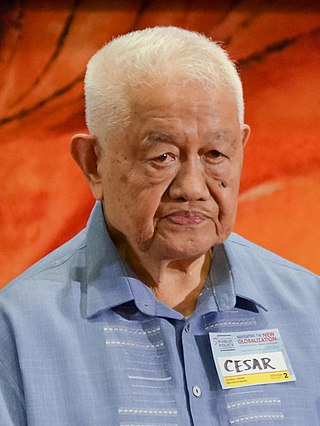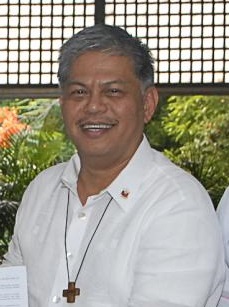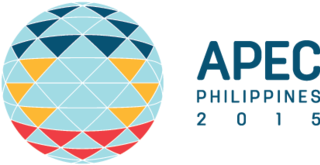
The Asian Development Bank (ADB) is a regional development bank established on 19 December 1966, which is headquartered in 6 ADB Avenue, Mandaluyong, Metro Manila 1550, Philippines. The bank also maintains 31 field offices around the world to promote social and economic development in Asia. The bank admits the members of the UN Economic and Social Commission for Asia and the Pacific, and non-regional developed countries. Starting with 31 members at its establishment, ADB now has 68 members.

The economy of the Philippines is an emerging market, and considered as a newly industrialized country in the Asia-Pacific region. In 2024, the Philippine economy is estimated to be at ₱26.55 trillion, making it the world's 32nd largest by nominal GDP and 13th largest in Asia according to the International Monetary Fund.

Bataan, officially the Province of Bataan, is a province in the Central Luzon region of the Philippines. Its capital is the city of Balanga while Mariveles is the largest town in the province. Occupying the entire Bataan Peninsula on Luzon, Bataan is bordered by the provinces of Zambales and Pampanga to the north. The peninsula faces the South China Sea to the west and Subic Bay to the north-west, and encloses Manila Bay to the east.

Cesar Enrique Aguinaldo Virata is a Filipino former statesman and businessman who was the fourth Prime Minister of the Philippines from 1981 to 1986. He is currently the corporate vice chairman of the Rizal Commercial Banking Corporation. He is the eponym of the Cesar Virata School of Business, the business school of the University of the Philippines Diliman.

The Department of Foreign Affairs is the executive department of the Philippine government tasked to contribute to the enhancement of national security, protection of the territorial integrity and national sovereignty, to participate in the national endeavor of sustaining development and enhancing the Philippines' competitive edge, to protect the rights and promote the welfare of Filipinos overseas and to mobilize them as partners in national development, to project a positive image of the Philippines, and to increase international understanding of Philippine culture for mutually-beneficial relations with other countries.

The Department of Finance is the executive department of the Philippine government responsible for the formulation, institutionalization and administration of fiscal policies, management of the financial resources of the government, supervision of the revenue operations of all local government units, the review, approval and management of all public sector debt, and the rationalization, privatization and public accountability of corporations and assets owned, controlled or acquired by the government.

This article covers the history of the current Philippine republican state following the 1986 People Power Revolution, known as the Fifth Philippine Republic.

Brother Armin Altamirano Luistro, FSC is a Filipino Lasallian Brother who served as secretary of the Department of Education of the Philippines under President Benigno Aquino III. Luistro entered De La Salle Scholasticate in Manila on April 1979 while he was studying in De La Salle University (DLSU). He received the religious habit of the congregation on October 1981 at the La Salle Novitiate in Lipa. He professed his first religious vows on October 1982, and his final vows on May 1988.
Jesus P. Estanislao is a Filipino economist best known for having been the 6th Socio-economic Planning Secretary and concurrent Director-General of the National Economic and Development Authority (NEDA) from 1989-1990, and Secretary of Finance of the Philippines from 1990-1992, during the government of President Corazon Aquino. He presently heads two private institutes committed to governance reforms: the Institute of Corporate Directors, and the Institute for Solidarity in Asia. He also chairs the President's Governance Advisory Council, which advises the Philippine President on governance issues.
The Philippines' water supply system dates back to 1946, after the country declared independence. Government agencies, local institutions, non-government organizations, and other corporations are primarily in charge of the operation and administration of water supply and sanitation in the country.

The presidential transition of Benigno Aquino III began when he won the 2010 Philippine presidential election. On June 9, 2010, at the Batasang Pambansa Complex, in Quezon City, the Congress of the Philippines proclaimed Aquino as the president-elect of the Philippines, following the 2010 election with 15,208,678 votes, while Jejomar Binay, the former mayor of Makati, was proclaimed as the vice president-elect of the Philippines with 14,645,574 votes, defeating runner-up for the vice presidency Mar Roxas, the standard-bearer of the Liberal Party for vice president.
Fiscal policy are "measures employed by governments to stabilize the economy, specifically by manipulating the levels and allocations of taxes and government expenditures". In the Philippines, this is characterized by continuous and increasing levels of debt and budget deficits, though there were improvements in the last few years of the first decade of the 21st century.
The term "Hyatt 10" refers to a group of seven secretaries of the Cabinet and three heads of government agencies in the Philippines who resigned their posts on July 8, 2005, as a result of the Hello Garci scandal, which allegedly implicated then-President Gloria Macapagal Arroyo in rigging the 2004 general election in her favor.

Arsenio Molina Balisacan is a Filipino economist and academician currently serving as the Secretary of the National Economic and Development Authority (NEDA). Balisacan first served as the NEDA Secretary from May 2012 to January 2016 under the Benigno Aquino III administration. He then served under the Duterte administration as the Chairperson of the Philippine Competition Commission from February 1, 2016, to June 30, 2022. He was again appointed as NEDA Secretary under the Bongbong Marcos administration. During his first term in 2012, he concurrently served as NEDA Secretary and as Chairman of the Boards of the Philippine Statistics Authority, Philippine Institute for Development Studies, Philippine Center for Economic Development, and Public-Private Partnership Center.

APEC Philippines 2015 was the year-long hosting of the Asia-Pacific Economic Cooperation (APEC) meetings which concluded with the APEC Economic Leaders' Meeting held on 18–19 November 2015 in Pasay, Metro Manila. It was the second time the Philippines hosted the summit, the first being in 1996.
APEC Philippines 1996 was a series of Asia-Pacific Economic Cooperation meetings focused on economic cooperation, held at the Subic Bay Freeport Zone in Subic, Zambales on 24–25 November 1996. It was the eighth APEC meeting in history and the first held in the Philippines.
The following are the events in related to Philippine law in 2016. This includes developments in criminal investigations of national notability.

Carlos "Sonny" García Domínguez III is a distinguished Filipino businessman who was appointed as Philippine Cabinet Secretary thrice: as Minister of Natural Resources (1986-1987), Secretary of Agriculture (1987-1989), and as Secretary of Finance (2016-2022).


















